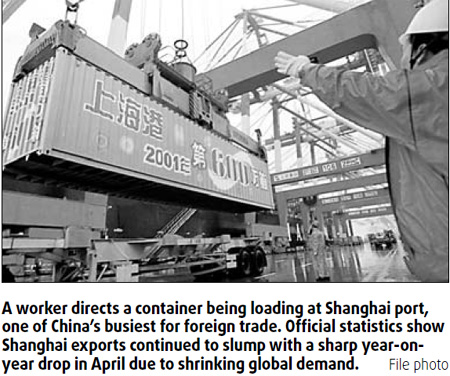


Shanghai's exports continued to decline sharply last month, widening its downturn since March and leading some analysts to believe that a rebound may not be sustained if external demand continues to remain weak.
The city's exports fell 26.2 percent year on year in April to $25.13 billion, compared to a decline of 16.4 percent in March, according to a statement from Shanghai Customs.
There was, however, a glimmer of hope as the Shanghai Statistics Bureau reported that the decline in industrial production moderated in April, falling 5.2 percent year on year to 184 billion yuan, compared with a 7.1 percent drop in March.
"The contraction of production reflects the negative influence of the global recession on the city's economy. But from the new data, we can see some signs of recovery," said Wang Zehua, a bureau analyst.
Other experts were less optimistic as the city's industrial output and exports disappointed for the sixth consecutive month.
"The mixed data shows that the road to recovery won't be smooth," said Lu Jianfeng, a Bank of China analyst. "If demand from the United States and Europe fails to pick up in a sustained manner, any improvement in exports or manufacturing will be short-lived."
Shanghai's exports to European Union countries fell 32.1 percent in April to $5.42 billion, according to the Customs statement. The decline was 13.5 percentage points higher than in March.
Customs officials said that exports to the US and Japan also posted huge drops in April, but the declines were smaller than those for the EU. Specific figures were not provided.
Shanghai's economic growth tailed off to 3.1 percent in the first quarter of this year after posting a 9.7 gain for all of last year, the first single-digit growth in 17 years.
On May 11, Shanghai Party Secretary Yu Zhengsheng said he expected that Shanghai's industrial output would start growing in June, as the city's month-by-month economic indicators are improving.
Shanghai Mayor Han Zheng said on May 13 that Shanghai is confident it will achieve economic growth of 9 percent this year and noted that consumption, investment and employment are showing signs of recovery.
"We expected retail sales and investment to improve last month," said Wu Ke, a Zhongtian Investment Consulting Co. analyst. "As exports may be volatile this year, consumption and investment will play key roles in helping the city realize its economic target."
Although there have been some positive changes to China's current economic situation, leading indicators show that China's export condition will remain bleak for some time, said an official at the Department of Foreign Trade in the Ministry of Commerce recently.
As he pointed out in one of a series of comments on the current business situation published on the Ministry of Commerce's official website, at present the number of orders placed has dropped for most exporters, and overseas buyers are opting for short-term, small contracts instead of long-term, large orders.
At the 105th China Import and Export Fair, the number of export deals made dropped by 16.9 percent compared to the 104th fair. All these figures indicate that there will be a lack of power and stamina in the growth of processing trade and exports of foreign-funded enterprises for some time.
The official also pointed out that China's current foreign trade situation remains complicated and grim. Firstly, external demand has shrunk and international trade has dropped. According to the latest forecast by the International Monetary Fund (IMF), the global economy will shrink by 1.3 percent in 2009.
Secondly, conditions for trade financing have deteriorated and risks have increased. At present, worldwide trade financing gap stands as high as $100-300 billion. Importers and exporters in many countries have been forced to cut back their businesses or go bankrupt because of funding shortages. The situation has seriously affected the normal operation of international trade. At the same time, Chinese export enterprises are facing escalated risks.
Thirdly, trade protectionism has begun to surface, making it harder to develop new markets. The financial crisis has led to a slowdown in the global economy. Some countries and regions have successively adopted a number of trade protectionism measures such as raising import tariffs, or prohibiting or restricting imports, which has resulted in a period of high trade friction among countries.
Also, a number of countries are competing against one another to devalue their currency in order to weaken the price competitiveness of Chinese exports. In the first quarter of 2009, South Korea, Indonesia, Malaysia and Mexico all devalued their currencies against the US dollar by 9.6 percent, 5.4 percent, 5.3 percent and 2.7 percent respectively, while the exchange rate of renminbi to the US dollar essentially remained unchanged, creating an exchange rate appreciation of 2.58 percent.
This has weakened the price competitiveness of China's exports in international markets.
Xinhua -- CBW
(China Daily 05/25/2009 page5)













